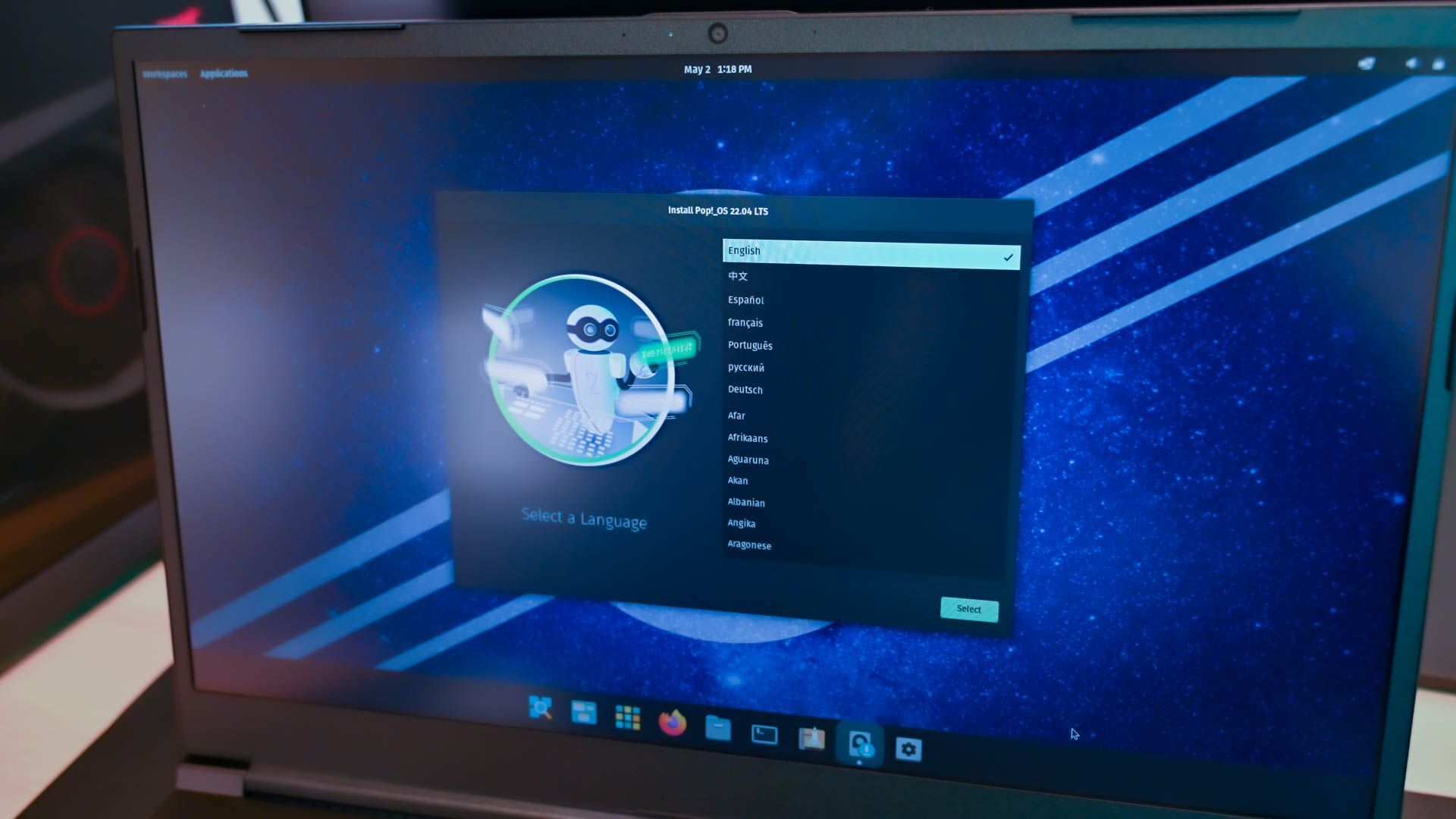Ubuntu’s popularity often makes it the default choice for new Linux users. But there are tons of other Linux operating systems that deserve your attention. As such, I’ve highlighted some Ubuntu alternatives so you can choose based on your needs and requirements—because conformity is boring.
Is Garuda Linux really that good for gamers?
It ships with some gaming stuff, uses zen kernel, has some performance mods (I guess), and a theme as ugly as sin. But you can make any distro do what it does. I’m sure it’s in the same territory as Nobara.
It’s Arch Linux with preinstalled stuff right from the install. I won’t recommend it, you still would need a good amount of knowleadge first to drive an Arch based system.
Imagine a Windows modification with some gaming tools preinstalled and scripts for one-click install things that usuallu take five clicks. Great, but only to speed up things you do often.
Thanks for the heads up. I lost interest with “good amount of knowledge” (which I have almost none)
What are good dual boot friendly options? I still game too much to ditch windows and dual booted Ubuntu but meh Ubuntu lol
I mean anything but the atomic distros will dual boot just fine. GRUB is GRUB. I have the most experience with Debian-based distros, but they all dual-boot just fine.
Linux Mint is a popular alternative.
But all options can be dual booted as far as I know!
Some don’t play nice with dual booting. I’m honestly not familiar with the “why” but a couple of distros I looked at (one was one of the gaming forward ones, forget which) are outright like "don’t dual boot this and if you do don’t come crying to us.
I’m guessing they struggle seeing other file system types but I have no idea.
Oh that is news to me. I always assumed a partition was all it needed.
I honestly don’t know what the issue is, but if the distro page is like “don’t fuckin do it” I just believe them 😂
Mint sets up the entire dual boot and partitioning during the install. You just choose how much space for Mint. Very easy and intuitive.
I consider Linux Mint Debian Edition to be the starter distro that Ubuntu was, >10 years ago.
Would you recommend something different for someone who doesn’t need a “starter” but still wants to dual boot? I’m not super unfamiliar, I just haven’t bothered for a long time
I’m using Pop OS, pretty good IMO
Flashing pop onto a USB now, let’s give it a go! Any tips on gaming tools? I think I read about some newer compatibility thing but can’t remember what it was called lol.
Linux is flawed. everything use systemd.
The only clean living is BSD, in my opinion OpenBSD is the easiest. NetBSD prior to 10.x does not have SSL certificates preinstalled. FreeBSD needs you to manually install X. Both FreeBSD and NetBSD have a menu based installation, while OpenBSD is question-based, and their disklabel tool have automatic partitioning.
Nice meme
Recommending Pop_OS! to newbies
That might just be the quickest way to make someone hate Linux forever. The glitchiest, most troublesome install I’ve ever tried to do. In the end, after two days of work just to get the damn live image to boot, the only reason I kept going was probably sunken cost falacy.
Funny. The one time I installed it, I just stuck it on a usb, booted from it, started the installer, next, next, done.
I really didn’t have much of a different experience between installing pop os Vs Ubuntu.
I guess some weird hardware thing that Pop OS doesn’t provide for?
Yeah, maybe. My experience has been a multitude of hangs and flash drive rewrites. At first, I thought my flash drive might be bad, so I tried another and quickly determined that the other one was actually bad before going back to the first. Eventually, I ended up just unplugging everything out of desperation and for some reason that worked.
I’m actually still working on this as I type this, currently waiting on partition changes because, while I read that 500MiB is recommended for Pop’s boot partition, the installer has told me that it’s too small…
Since I’m still dealing with this, and given the issues I had booting the live disk, there’s a good chance this won’t even be useable in the end. I’ve used Ubuntu before, and it boots fine, but fuck if I want to deal with snap.
Edit: Went up to 750MB (yeah, MB not MiB here, easier to think about later). Still says it’s too small. Sure wish I had some detailed documentation to work with here, instead of just “use Clean Install” in the official docs and a single Reddit comment saying “500MiB is good.” That would the bee’s damned knees.
Well glad you got it sorted.
I think it requires 1GB and it’s an incredibly recent requirement that that does not show up well in most search results. I had the same issue on a recent install and I had to go searching around the internet to figure out the actual size like you did lol.
So Ubuntu, Ubuntu and unstable arch… here let me have a go:
- Fedora
- Tumbleweed
- Endeavour OS
- easy install arch with extra repos, zfs and and dracut
- Bonus for the curious
- void
- Redcore Gentoo
I agree with the Fedora recommendation. Just a all round great experience.
Ubuntu isn’t your only option
Thumbnail shows
Pop!_OSwhich is a fork of Ubuntu.For now. They’re switching to Debian.
I was looking for some information on this but couldn’t find anything. Do you have a link or any more info on them moving to a Debian base?
Hm. I don’t think I dreamed it, but now all I can find is a Reddit post where mmstick says the next version will be based on Ubuntu 24.04.
Maybe I was conflating it with Linux Mint.
Linux Mint already has an alternative Debian edition maintained.
Ah that makes sense. I didn’t know about Vanilla so thanks for updating that.
I know Pop is updating with their own DE “soon” and thinking they were changing their base as well would have been quite an undertaking
Cosmic does look really nice.
I thought the DE was already out.
They’re making their own from scratch because modifying Gnome became too much of a pain. It’s got the same name, which is confusing.
This is probably why I had it in my head that they were doing the Vanilla thing, in that they are both departing from their long-standing fork.I mean I get that, but I could’ve sworn cosmic was already out.
New article: Debian isn’t your only option
Yeah but it’s the best one
Step 1: install Debian
Step 2: install a bunch of packages essentially making it UbuntuYou are doing it wrong, then.
Step 3: Don’t install Snap & have a better time
Very true. Snaps are the worst. I don’t even get why Canonical hasn’t decided to just drop them already
Because they want control.
Sunk cost fallacy?
From an engineering perspective, I prefer Debian distros. Apt is the greatest package manager ever built. For a production server, I’d choose Debian or maybe Ubuntu if I needed to pay someone for support.
But for a desktop, Ubuntu kinda sucks. These days, I think I’d recommend Fedora to Linux noobs.
And for my toys at home, I run Arch btw.
Heard. Debian in the streets, Arch in the sheets!
ubuntu uses apt too…
Yep. From an engineering perspective I prefer Debian distros. Ubuntu is a Debian distro. I said I would consider using Ubuntu in prod, and this is the reason.
well considering the title being “ubuntu isn’t the only option” and you following “i prefer debian” with how good apt is… im sure you can see how that was misleading, then.
What can the apt of Debian do that Ubuntu can’t
Nothing. They’re mostly the same thing.
The Ubuntu version will sometimes print “ads” to your terminal :P.
For a prod server, I’d choose Debian over Ubuntu if I didn’t have paid support, because I’m not a fan of Canonical. If I needed paid support, I’d choose Ubuntu, because Debian is strictly a community distro. (That community happens to include major companies, like Google.)
Bit of a noob but what’s the practical differences between Apt and the others. I use Fedora and the only difference I notice is that instead of typing apt update and apt upgrade, I just type dnd update.
Practical difference: Both dnf and apt are slow as hell. Pacman is flying compared to them.
I was fighting rpm hell on redhat for the 3rd or 4th time using red hat linux 5 to 6 or perhaps 6 to 7. When i first installed debian potato on my daily driver. We had 20 ish servers, but the constant hunt for the right combo of rpm’s made me distro jump my own machine. A while later i was floored when i could apt-get full-upgrade to the next debian version without rpm hell and almost everything just worked. Never installed another redhat machine and have been using debian + kde ever since. And 99,3% of all servers i maintain are now debian. A few odd ubuntu machines for $$reasons.
Is rpm hell gone for good nowadays?
Apt is the greatest package manager ever built.
What’s your rationale for making that claim?
See the other thread.
TL;DR: Useful abstractions and a hell of a dependency solver.
Last time I used latest Ubuntu:
-
Default scaling on login screen and desktop sucked. If I had vision problems it would be unusable.
-
Settings application crashed after trying to open half of the menus.
-
Despite user interface looking like it’s made for tablets, the actual touch usability was horrible. I couldn’t even resize windows without being precise as fuck and there was no windows snapping despite it being a feature on Windows for more than a decade.
-
Couldn’t double click on Windows program to run it in Wine despite it being possible 10 years ago.
-
Reliance on snaps, even though installing software from 3rd party sources still being horrible.
-
Apt is the greatest package manager ever built.
Urgh, no, it’s not. Everything about it is super crusty if you go beyond simply installing packages and adding others’ PPAs IMO.
- Packages often enable the services they install right away. Someone told me they got locked out over SSH because they installed a firewall package that locked everything down by default, and the service got started on install. I guess that’s technically more of an issue with the way things are packaged rather than the package manager itself, though.
- To temporarily install a package (so that it will get uninstalled with the next autoremove) you need to use aptitude to install the package, or run apt-mark auto after installing (which will also clear the manually installed flag if it was manually installed before), apt has no syntax for it.
- dpkg-scanpackages is eternally slow, I had to write a wrapper for it that runs it separately for every package and caches the result because I didn’t want to wait multiple minutes for it to rebuild the PPA package index
- The standard packaging tools (dh-make or debuild, I think I’ve looked at both) are insane, so much so that I gave up and wrote something that takes files similar to Arch PKGBUILDs which calls dpkg-deb at the very end.
I could probably list more but I haven’t had to touch apt in a while, thankfully. But it is probably the #1 reason I avoid anything Debian-based. #2 is probably their Frankenstein sysvinit/systemd setup.
I do have to say that apt remove vs purge is pretty cool though.
What do you like about it?
Packages often enable the services they install right away.
That’s a problem of the package, not the package manager.
Generally this fits with Debian’s philosophy. But regardless I think it’s out-of-scope for why Apt is good. You could make a distro with Apt and not have your packages do this.
To temporarily install a package […]
I’m not talking about
aptthe CLI tool, but the actual package manager. The plainapttool is only designed to be a convenience wrapper for common workflows implemented in other tools.As you correctly pointed out, Apt has the distinction between packages installed as a dependency (“auto installed”) versus packages installed directly (“manually installed”). This is precisely one of the reasons why I consider Apt the best package manager. (Yes, I know other package managers can do this, not all though.)
If you want to install a package as manual, then later mark it as auto, you can do that with
apt-mark.dpkg-scanpackages is eternally slow.
Are you maintaining a PPA for others?
Frankly, I’ve never run into this problem.
The standard packaging tools […] are insane.
dh_makehelps you create a package that adheres to Debian policy, and there is good reason for Debian to have those policies. But if you’re just packaging something yourself, you don’t have to use it. It’s just a template for new packages.At the end of the day, all you really need to create a deb is to create two files
debian/controlanddebian/rules. These are the equivalent to a PKGBUILD. The control file specifies all of the dependency metadata, and therulesfile contains the install script.The difference in packaging philosophy is that PKGBUILDs are external and they download the upstream sources. On the other hand, in Debian, they rehost the upstream package and add the
debiandirectory. This means that building Debian packages is mostly hermetic: you don’t need access to the network.What do you like about it?
Mostly that it makes super useful distinctions between concepts. But there are other goodies.
- Manually installed versus auto installed.
- Uninstalled versus purged.
- Upgrade versus Dist Upgrade.
- Dependency versus suggestion versus recommendation.
- The alternatives system.
- Pinning, and relatedly that packages can include version constraints in their dependencies.
- Interactive configuration at install time.
- Support for both source and binary packages.
I also do appreciate that Debian pre-configures packages to work together with the same set of conventions out of the box. But again, that’s a property of the packages, not of Apt.
I’m not talking about apt the CLI tool, but the actual package manager. The plain apt tool is only designed to be a convenience wrapper for common workflows implemented in other tools.
Sure, but the interface is probably just as important as the actual logic behind it, isn’t it?
As you correctly pointed out, Apt has the distinction between packages installed as a dependency (“auto installed”) versus packages installed directly (“manually installed”). This is precisely one of the reasons why I consider Apt the best package manager.
Honestly I would consider that one of the fundamental things a package manager must do, I didn’t think it was a special thing haha
If you want to install a package as manual, then later mark it as auto, you can do that with
apt-mark.Yeah, I know. But if you want to manually install a package like that, you have to remember the extra step after it’s finished installing instead of before the install. It’s just unergonomic, for something that could be a flag (e.g. in
emerge -1) and that I at least use fairly often.Another problem with it being a two-step thing is that if you do it unconditionally in a script, it doesn’t retain the flag from before the previous installation command, you need a third step, i.e. checking if the package was installed before. My use case for this was installing dependencies for a package build which should be able to be removed again afterward, while not affecting the subset that were already installed explicitly.
Now that I think about it, it’s probably a good idea to always check if a package needs to be installed before installing it if you script it, though, because otherwise it might be unnecessarily reinstalled. Fair enough.
Are you maintaining a PPA for others?
Yeah, I maintain some software/config/meta packages for the computers at the uni I study at. Before, I’m pretty sure the packages were manually packaged with every update and I wanted to automate it a bit and also make clear how to get from the source tarballs to the final build.
On the other hand, in Debian, they rehost the upstream package and add the debian directory. This means that building Debian packages is mostly hermetic: you don’t need access to the network.
Ahh, the way it’s structured makes a lot more sense knowing that. Coming from packaging stuff for Arch, Gentoo and NixOS, where the packaging process is essentially the same for all three, with you usually supplying source download URLs, I had absolutely no idea how debian/rules would allow me to do anything and felt like I was missing a big thing. I guess it really is just a Makefile that you run directly, and that makes sense if you already have the sources in your tree?
- Pinning, and relatedly that packages can include version constraints in their dependencies.
This, at least version constraints, is another one I’d consider essential tbh. The rest are great though, I agree.
Sure, but the interface is probably just as important as the actual logic behind it, isn’t it?
The logic is why I love Apt. Most robust dependency resolution algorithms I’ve used.
But also, I don’t have any issues with the CLI. Having a distinction between
apt-getandapt-cacheandapt-markdoesn’t feel weird to me. You’re practically just separating the top-level sub commands by a dash instead of a space. Theaptcommand is really just a convenience thing, and there are specialized tools for the more advanced things. Which is fine by me.Also, the top level
aptcommand doesn’t guarantee a stable CLI, so for scripting you’re supposed to useapt-getand friends anyway.Honestly I would consider that one of the fundamental things a package manager must do.
You’d be surprised. Homebrew (the de facto standard package manager for macOS) doesn’t do this. Though, you can at least lookup the “leaf” packages which are not dependencies of any other package.
And, most language-specific package managers can’t do this. E.g. if you install software with
piporcargo.you have to remember the extra step after it’s finished installing
If the package is in use, it shouldn’t be an orphan.
For example, what if you race with a cleanup job that is removing orphans? (Debian is hyper stable, so I often enable unattended upgrades with autoremove. I’m not so comfortable doing that on Arch ;)
What you’ve described is just an
apt-get installwhen you start and andapt-get removewhen you’re done. Or more properly setting it as a build dependency in your source package, to let Apt handle it.But also, why uninstall build tools?
This, at least version constraints, is another one I’d consider essential tbh. The rest are great though, I agree.
Yeah, version constraints are common. But most other package managers bail with an error when they encounter a conflict. Apt is really good about solving conflicts and proposing solutions. Often it will propose multiple solutions to your conflict for you to choose from.
Again, it’s the solver part of Apt that makes it the best IMO.
What about Ubuntu derivatives for desktop? My go to recommendations are Pop! OS and Linux Mint (which I use).
Linux Mint Debian Edition is my standard recommendation for desktop for those newer folks.
Straight up Debian for everything else. Debian is my desktop. And all of my servers (aside from some things I’m testing for work or something where I need to test against RHEL or something).
And Proxmox for VMs.
Pop! Os user going on a year now and I can’t recommend it enough, at least as a first distro.
Fedora’s near daily update and restart cycle is so annoying esp when you have an encrypted hard drive. I know it’s part of the deal and I’m lazy, but all I’m using it for is a Jellyfin client.
Same. Albeit I’m on manjaro which suffers from the same issue. Distro hopping on an encrypted drive with no separate home partition is a huge pain in the butt
What do you mean restart cycle? You only have to restart if you want to load the new kernel (there’s technically a way to avoid even that). If you don’t feel like installing a better tool for the job like Debian, just update less, most of your packages will still be newer than most distros. Also not sure why you would encrypt if its just jellyfin client.
In the Software Manager, whenever there is an update you must press “Restart & Install” in order to update. Never seen a restart not be required. Why would I not update when I would be potentially miss important security patches?
Also I typically encrypt during install for enhanced privacy. Probably overkill but yeah. I don’t really have a specific reason other than that.
My other system is Linux Mint 21.3 and restarts are very infrequent.
Ah I am not familiar with the software store, you don’t have to do that from the command line. And thats true, I’m not suggesting to never update, just less. Also if theres not much to steal on your computer, saftey is a little less important. I would personally feel comfortable updating once per month but thats up to each user. I sat on fedora 37 for way too long because Ubuntu made me afraid of major upgrades.
The problem with going for alternatives is support.
Imagine picking a random Linux flavor, then trying to figure out how to change settings, only to get either hundreds of different answers.
Depends on the alternative. E.g. Fedora and OpenSuse have very active communities and lots of help available.
You’re not going to get a telephone number you can call, but the documentation maintained by Arch is far superior to that offered by Ubuntu. If support is your biggest concern, you’re far better served by Arch.
Lol I chuckled at that telephone number part
That’s fine for someone willing to read documentation, the average user would rather read a forum post, which Ubuntu has a shit load of posts about using and fixing it.
alpine is great if you don’t plan to use a gui and just want to set up command line stuff. not all new linux users are looking for a desktop replacement. some just want a server for file sharing or running plex, etc.
I use OpenBSD, and Alpine is the only Linux distro I can recommend :)
It is somewhat like FreeBSD (not having X by default), and they are both not friendly to newbies when compare to OpenBSD.
People should start with a free and sane default and gather knowledge, not start with a beautiful desktop environment (integrated graphical environment) and use browser and libreoffice and proprietary software on their device.
deleted by creator
Debian is good until you need to install a PPA :\
out of the loop since I’ve moved to debian and been using flatpak for the last few years, what software are you installing via PPA that isn’t generally available via flatpak?
“PPA” is Ubuntu’s branding for third party repositories. So, of course you will have a hard time adding a Ubuntu-specific third-party repository to anything that isn’t the Ubuntu version it’s made for…
Debian of course supports third party repos, just like Ubuntu. On Debian they just aren’t called “PPA”.
For more information on how to add third party repos to Debian (or Ubuntu, if you don’t use Canonical’s weird tooling), check out the Debian Wiki page on UseThirdParty or SourcesList. There’s also an (incomplete) list of third party repositories on the wiki: Unofficial. And just like with PPAs, anyone can host a Debian repo.
One time the installer got stuck on my hardware. Never again. Debian deserves a lot of credit but personally I will not go near an OS unless I am certain in advance that the initial installation will go without a hitch.
To add to that, there’s so much “support” out there for Debian and by proxy Ubuntu. You can Google any error and you’ll find the fix. That’s what draws new people to them. Even my self even though I’m not new to the Linux ecosystem. Ubuntu makes a perfectly good and stable server operating system.
Debian is in many ways the “deep end”. A big part of its development philosophy is prioritizing their weirdly rigid definition of Free Software and making it hard to install anything that doesn’t fit that. I’m not saying it’s not a good distro, but IDK if it’s beginner friendly.
Debian is in many ways the “deep end”.
The first time I tried Debian was when I was new to Linux, on a laptop with both the Ethernet and Wi-Fi unsupported. On top of which, it had an nVidia GPU. It was hard.
Now I know much more about Linux and checked the Motherboard for Linux support before buying it. Debian works pretty well.
So, it’s beginner friendly as long as someone helps you out with the installation after checking up on all the stuff you will need to run.
So, it’s beginner friendly as long as someone helps you out with the installation after checking up on all the stuff you will need to run.
In other words, it’s not beginner-friendly
I’ve only recently switched to Debian after a couple decades with Ubuntu (because snaps) and I had a few issues during installation.
The net install failed to configure my wifi so I had to download the DVD/CD install. That worked but then I had to manually nano several config files to fix about 5 broken things for some reason.
I installed it recently on a different system, and went with the Live option (gnome) and it installed 10x easier and smoother than Ubuntu. It installed in about 4 minutes (on a new/fast computer).
So I would say Debian Live is VERY beginner friendly, but the other install methods are all messed up for some reason. Ubuntu’s default option is the Live option so I think that if Debian just kinda hid the other options on their website it would be 100% beginner friendly…
The easiest hack I have encountered is to install netinstall Debian, and then on top of it, again install same Debian, without configuring or touching anything. When Debian is installed for the first time, it writes those cdrom folder files, which Debian detects upon a reinstallation. As weird as this sounds, it works reliably, both on my SSD/HDD laptop and ancient desktop with single HDD.
Last month I dualbooted my old Windows 7 desktop with Debian 12 GNOME, works smoothly until I open 10+ Firefox tabs, a Spotify stream and a video in MPV, as it has 4 GB RAM.
deleted by creator
deleted by creator
🤣
the first distro i used is debian when i was getting on linux and im still using it
Fedora is also apparently newbie friendly. IME, RHEL is not, but their free developer license is good if you want to learn working with it. Some employers use RHEL exclusively, so it’s not a complete waste.
deleted by creator
Normal users want that potential for getting their hands dirty to be zero at best
Exactly this. To normal people the computer in their house is merely a tool; just another appliance that needs to work every time without any fuss.
Debian? First time i installed it wanted to use CD for packages instead of online. Don’t know why. Second time it didn’t have wireless drivers as these were non free.
It’s a great distro but not for newbies.
Fedora all the way!
Non-free-firmware is now handled automatically during installation as of the most recent Debian release, just FYI. For reference, see the note at the top of this wiki page: https://wiki.debian.org/Firmware
That’s a recent development. I also though you had to get a specific build, not the normal one.
I had this problem a week or two ago when I tried to install Debian 12 on my old MacBook pro. Ended up installing something else.
Interesting, that’s kind of surprising. Do you mind sharing which model of MacBook Pro it was? I had been considering getting one for cheap for testing purposes. Also, it may not be useful to you at this point, but I figured I’d drop a link to the Debian Wiki which has a page for MBP-specific info, in case anyone reading might benefit: https://wiki.debian.org/MacBookPro
I have a late 2011 MacBook pro with a broadcom wireless card.
I’ve used this laptop to distrohop a bit and the wireless driver is always an issue. You have to install the broadcom DKMS driver or wi-fi will randomly disconnect after a random amount of time.
Not the first time trying Linux, but the first time in the last 10 years since I tried it and I’m digging Mint. Still has problems with my Logitech steering wheel and Logitech mouse, but overall not bad.
I just had a flashback to 1999 and compiling a custom kernel to get my damn Logitech mouse to work.
Anyone else notice that the first three are Ubuntu?
Corporate wants you to find the difference…
“They’re the same picture” Pam from The Office
Pop!_OS is lovely and the people behind it helpful. Works so well on my System76 laptop (obviously).
I can’t say I can fully complain about Ubuntu when Mint came about because of it. Also because I have no other choice than to use a Ubuntu server distro for one of my classes.
The funny part about that is our instructor had us install a GUI and didn’t choose gnome because he doesn’t like it. He said it’s a pain to use, which I don’t have an opinion on either way since I’ve only ever used it for a combined total of less than a year.
To any Linux curious users,
I consider myself to be an intermediate Linux user. I have hosted applications and services on Linux servers in the cloud and use it as my primary operating system. I recommend Linux Mint. If you have an nvidia GPU, then I recommend PopOS as they have a version that has nvidia drivers pre-installed.
When I first started with Linux, I thought that Mint was less capable than other distros as it was the most user friendly. But I learned that you can do anything you want with any Linux distro. It is just that Mint is the least likely to give you trouble with random things.
With that all being said, you will have far fewer issues with Linux than you will with Windows.
Additionally, you can get legit troubleshooting steps for linux that actually work. With Windows it seems that there are 100 ways to possibly fix an issue and they feel like patching a sinking boat.
i’ve been pushing mint for years because it truly is just that good. everything just works. easy to learn. lots of easy customization available by default for even beginner tinkering. there is no headache or issues with drivers, patches, or software, ever.
but unfortunately (most recent versions) have become more prone to heavy slow downs and the new store in the latest update is utter trash.
I think that’s something that people should emphasize to Windows & MacOS/iOS users more, the problems are impossible for you to truly resolve, and the next update could make your program that fixes said problems obsolete, or makes it impossible to control what network traffic your computer sends entirely in order to torrent Windows Updates to other users. Linux has presented me with problems which can be solved in a variety of ways and really helpful troubleshooting resources that have a side benefit of introducing you to cute online groups of people who tend towards anti-corporate politics/incoherent left libertarian at a minimum



























